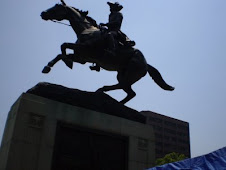More about Michelangelo and the Pope
Julie Z asked me how Ross King knew that Michelangelo used a scaffold. I scoured the book and came up with an answer: M wrote a poem about it, illustrated with a sketch of him painting the ceiling, reaching his arms above his head and bending backwards like Ginger Rogers dancing with Fred Astaire--okay, not leaning that much, but definitely leaning, and complaining about it. As he seemed to complain about everything, especially his rotten family, a bunch of do-nothing brothers who just lounged around his father's house, enlarging their carbon footprints.
Now I am reading about Robert E Lee, a biography by Charles Bracelen Flood. It's almost a hagiography. Apparently Lee had some quality that led other men to like him, look up to him, and follow him, even unto death. He was offered the command of Union forces, but turned it down, unwilling to fight against his native state, Virginia.
Apparently he had something that did not outlast his life. Call it charisma. I remember how people worshipped Roosevelt when I was a tot. Nowadays he is receding into history, but Churchill said that meeting him was exhilarating, like your first taste of champagne.
Update: Apparently leaning back to paint had little or no ill effect on Michelangelo, who died at 89.











5 comments:
Re: Michelangelo and the scaffold - I read the famous Stone's novel but don't remember a thing about the method M. employed in painting the ceiling.
An illustrated poem by Da Man himself!
Thank you for scouting that out; now I really shall read that book.
Now, about Churchill being "exhilerated" on first meeting FDR: from the vantage point of decades later, I have at least three knee-jerk responses.
1. What a fool!
2. Boy, that love affair didn't last long, did it?
3. "Charisma" originates in the Greek for "happy." FDR was not happy, in the sense of a clear-headed, competent, well-situated in work, benevolent human being. No, he was not happy; he was frivolous.
So how could Churchill fall for any charisma, even temporarily? I wonder if he figured that out at any subsequent time.
I cannot answer my own question, since two distinct collections of Churchill's works sit around me unread. I am reading "Uncle Tom's Cabin," published in 1852, when the charismatic Lee was doing - what?
What was Lee doing in 1852, and did he ever read Harriet Beecher Stowe?
As I say, charisma doesn't outlive a man (or woman). FDR had it to spare.
Lee was in the U S Army; he was commandant of West Point at one time. he was asked to lead the Union troops before the war, which proves he was held in high esteem. Even small children loved him. Charisma? He was an aggressive general; his men loved him, and the Confederates gave the Union troops a hell of a fight, though they were greatly outnumbered.
Julie, I must do more research to find out what Lee was doing in 1852.
Lee was superintendent of West point in 1852.
Let me add expand on Lee's qualities: he was second in his class as West Point and had received no demerits during his student days there, and he was said to be the handsomest man in the army. Judging by his portraits, he was indeed a handsome young man, which doesn't hurt in the charisma department.
He was also--according to Charles Bracelen Flood, author of the biography I quoted--a very devout Christian.
When you finish the Flood bio, Miriam, try Elizabeth Brown Pryor's "Reading the Man" which is told through a huge collection of Lee's family letters Pryor acquired from a descendant.
Post a Comment